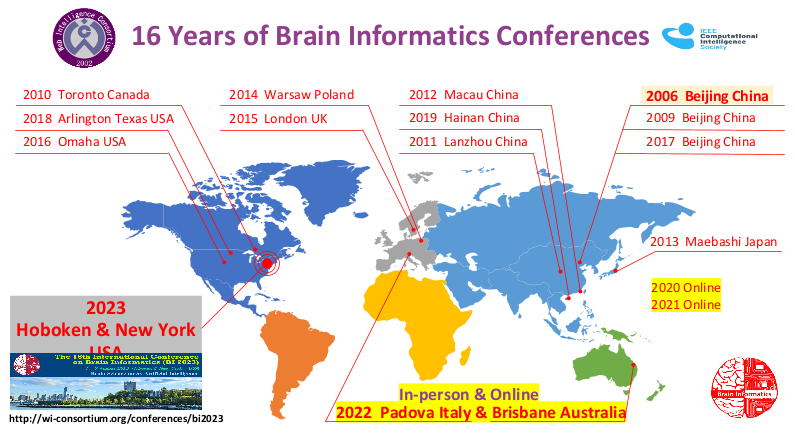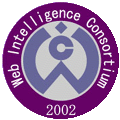Brain Informatics Conferences

Up-coming Conference
The 18th International Conference on Brain Informatics (BI 2025), November 11-13, 2025, Bari, Italy.
The International Conference Series on Brain Informatics
The International Conference Series on Brain Informatics are co-sponsored by the Web Intelligence Consortium (WIC), IEEE Task Force on Brain Informatics (IEEE TF-BI), and Springer Lecture Notes in Computer Science.
Tracks and Topics
Main Theme: Brain Science meets Artificial Intelligence
Track 1: Cognitive and Computational Foundations of Brain Science
- Brain dynamics
- Structural and functional connectome
- Neural foundations of intelligent behavior
- Learning mechanisms (e.g., stability, personalized user/student models)
- Multi-perception mechanisms and visual, auditory, and tactile information processing
- Reasoning mechanisms (e.g., principles of deductive/inductive reasoning, common-sense reasoning, decision making, and problem solving)
- Neural basis of decision-making
- Models of executive function & prefrontal cortex
- Higher-order cognitive functions and their relationships
- Adaptation and self-organization
- Digital, data, and computational brain
- Methodologies for systematic design of cognitive experiments
- Neuroeconomics and neuromarketing
- Neuroeducation, neurolinguistics, and neuroinstrumentation
Track 2: Investigations of Human Information Processing Systems (HIPS)
- Bayesian models of the brain, and causal modeling of behaviour for neurology
- Cognitive architectures and their relations to fMRI/EEG/MEG
- Computational mechanisms of learning and memory
- Computational models of sensory-motor control
- Conscious mental functions and subconscious information processing
- Emotion, heuristic search, information granularity, and autonomy related issues in reasoning and problem solving
- HIPS complex systems
- Investigating spatiotemporal characteristics and flow in HIPS and the related neural structures and neurobiological process
- Modeling brain information processing mechanisms (e.g., information organization, neuro mechanism, mathematical, cognitive and computational models of HIPS)
- Social brain communication
Track 3: Brain Big Data Analytics, Curation and Management
- Big-neuron, neuron morphology and neuron reconstruction
- Brain data collection, pre-processing, management, and analysis methodologies
- Brain connectome, functional connectivity, and multi-level brain networks
- Brain data grids and brain research support services
- Brain informatics provenances
- Brain mapping and visualization
- Cyber-individuals and individual differences
- Data brain modeling and formal conceptual models of brain data
- Databasing the brain, curating big data, and constructing brain data centers
- Development of data-driven markers of diseases, and behavioral biomarkers of neurological diseases
- fMRI and PET imaging registration and analysis
- Information technologies for simulating brain data
- Integrating multiple forms of brain big data obtained from atomic and molecular levels to the entire brain
- Knowledge representation and discovery in neuroimaging
- Large scale models and simulation of brains
- Machine learning algorithms for brain data analysis
- Measuring scale thresholds of brain big data
- Multi-aspect analysis in fMRI/DTI/EEG/ERP/MEG/PET/Eye-tracking data
- Multimedia brain data mining and reasoning
- Multimodal and combinatorial fusion for brain informatics
- Optogenetics and in-vivo cell imaging analytics
- Real-time fMRI and neurofeedback
- Remote neurological assessment
- Semantic technology for brain data integration
- Simulating and analyzing spatiotemporal structure, characteristics and flows in HIPS and neural data
- Statistical analysis and pattern recognition in neuroimaging
- Cloud and semantic brain data services
Track 4: Informatics Paradigms for Brain and Mental Health Research
- e-Science, e-Health, and e-Medicine
- Mental healthcare knowledge abstraction, classification, representation, and summarization
- Mental healthcare knowledge computerization, execution, inference, and management
- Mental health risk evaluation and modeling
- Personal, wearable, ubiquitous, micro and nano devices for mental healthcare
- Remote neurological assessment
- Social networks, social media, and e-learning for spreading mental health awareness
- WaaS (Wisdom as a Service) and active services for mental healthcare
- Computational approaches to rehabilitation
- Computational intelligence methodologies for mental healthcare
- Computational psychiatry
- Brain repair models and stimulations
- Clinical diagnosis and pathology of brain and mind/mental-related diseases (e.g., mild cognitive impairment, alzheimers, dementia & neuro-degeneration, depression, epilepsy, autism, Parkinson’s disease, and cerebral palsy)
Track 5: Brain-Machine Intelligence and Brain-Inspired Computing
- Brain-inspired artificial intelligence
- Brain-inspired cognitive computation and modeling
- Brain-inspired artificial neural networks
- Brain-inspired information processing
- Brain-inspired evolutionary systems
- Brain-inspired machine learning
- Brain-inspired / cognitive neuro robotics
- Brain-inspired / neuromorphic computing
- Affective computing and applications
- Brain-computer interaction and brain-robot interaction
- Brains connecting to the internet of things
Previous Brain Informatics conferences
Web Intelligence and Brain Informatics related workshops
- The 2010 International Workshop on Web-scale Knowledge Representation, Retrieval and Reasoning (Web-KR3 2010). Toronto, Canada.
- The 2006 International Workshop on Web Intelligence meets Brain Informatics (WImBI 2006). Beijing, China.
